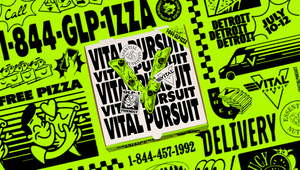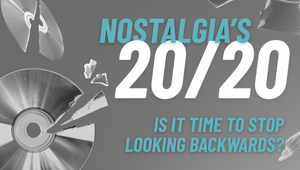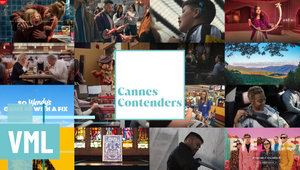
DE&I: Accelerating Change with Ezinne Okoro

Ezinne (Kwubiri) Okoro joined Wunderman Thompson in October 2020 as the agency’s first global chief inclusion, equity and diversity officer responsible for creating a comprehensive diversity, equity and inclusion strategy for Wunderman Thompson.
Ezinne previously made an impact on addressing inequality and lack of diverse representation in the fashion/retail industry as H&M’s first Head of Inclusion & Diversity for North America. At H&M, she designed strategic frameworks to drive inclusion, equity and diversity; facilitated thought-provoking conversations about corporate culture; and led innovative corporate change and community activism. She served as a principle advisor for various markets and the global H&M Group leadership team.
Ezinne was named to the Top 100 Transformers in Business by Business Insider in 2020, The Network Journal’s 40 under Forty and ESSENCE Magazine’s Women to Watch in Fashion. She is a sought-after thought leader and has been featured in various outlets, including Forbes, CNBC, Black Enterprise, Women’s Wear Daily (WWD), Variety and TheRoot.com. She is an active member of Delta Sigma Theta Sorority, Inc., and board member for She’s the First.
Ezinne has a passion for corporate social advocacy and cultural equality. An immigrant from Nigeria and a graduate of Howard University’s School of Business, Ezinne uses her experiences and network to support organisations that empower young girls and serve underrepresented communities.
LBB> What drew you to the field of DE&I?
Ezinne> I had that ah-ha moment in life, when I knew I wanted to be at the front of meaning, progressive, and inclusive change. My goal is to use my platform and influence to give space to those who are historically excluded, and to be a voice to share their stories, to infuse change in the world. IE&D has a profession is just another avenue for me to bring forth that change in the private sector.
LBB> Before it became your job role, what was your specialism? And how did you get involved?
Ezinne> My academic background is in auditing. I’ve worked in auditing, compliance, and business strategy, with a specialty in change management. I was introduced to change management during a business transformation project that I was working on focused on people and organiSational management. Change management was the right balance to incorporate my people / change advocacy into my compliance and strategy work.
LBB> There’s a lot of frustration around the industry’s glacial pace when it comes to improving IE&D across all sorts of axes. What’s getting in the way?
Ezinne> Simply put, inherited behaviour. We are comfortable in doing what we’ve been doing. Following norms, traditions, and habits, though it is clear from all the trend analysis that a change is needed.
LBB> Outside of the advertising industry, where do you see examples of large-scale meaningful progress (if at all), and what should our industry learn from it?
Ezinne> There is room for impactful and sustainable improvement across the board. Those companies or industries that may have slight 'advantage' are the ones that has clear financial investments in IE&D work, they are transparent with their data (also have an appropriate means of collecting such data), and going beyond the baseline traditional processes.
LBB> The dimensions of IE&D can differ somewhat according to geographic/cultural context - I’m curious, where you’re based, what are the big issues or most urgent elements of IE&D that you need to address? (And if your role covers more than one market/territory, how do you and your team navigate the local nuances while having a cohesive and consistent set of values?)
Ezinne> I am based in the US (east coast) and my role is to oversee our global operations (20,000 employees in 90 markets around the world). There are many considerations even within one region, not to mention the nuances between four different regions – APAC, EMEA, LATAM, and North America. It’s important to 1) define what the general commitments are for the organisation, 2) identify the markets you want to prioritise based on size, IE&D footprint, local regulations, and resources, and 3) socialise framework to other smaller markets for them to ideate and scale to their local needs. Overall, I still provide expertise and support all markets as needed, with a core focus on those key markets agreed upon. We mobilise the Global IED Council, whose makeup is of people across all regions, to amplify the work.
LBB> In your role, what have been some of the most meaningful projects or policies you’ve been involved in?
Ezinne> Establishing employee resource groups with a connector to the business strategic goal and having executive sponsors. This weaves the groups into the business plan and allows access to those members for future opportunities. Also driving conversation on workplace flexibility, external partnerships for community and development, and establishing key performance indicators for senior leadership to drive accountability.
LBB> What role are clients playing in holding agencies accountable and driving better IE&D (e.g. via RFPs)? Is this something you are seeing or would like to see more of?
Ezinne> Clients are key influencers and accountability partners in driving change within the agencies. In most RFPs, RFIs, and briefs, the client has a section about various IE&D-related topics – from team representation, to driving awareness, to progressive portrays in creative production. As they [clients] have their own commitments internally, we have collaborated in knowledge sharing sessions, and have been transparent on strategy and progress. An opportunity for clients is to alleviate some of the time pressure associated with projects. This reduction will allow more time to participate in engagement activities, such as workshops, development programs, community service, and activities hosted by employee resources groups.
LBB> What are your thoughts about where accessibility fits in the IE&D agenda?
Ezinne> It’s important that we don’t silo IE&D commitments to one identity or characteristic. We need to approach IE&D with intersectional lens. Considering the multi-identities, a person has that makes them unique and contributes to their experience (and needs). What does it mean to be an Indian person with disability that is from rural parts of the world? Each identifier offers a different unique perspective.
LBB> What resources/platforms/programmes have you found useful on your IE&D journey and would recommend to our readers?
Ezinne> Coqual, formerly Center of Talent Innovation is a fantastic organiSation that provides research and partnerships to aid in unlocking your IE&D journey. If you’re looking to validate a position or give your stakeholders insights on what different communities are experiences, they are strong partners. Rosecrans Ventures is another group to highlight. It is an early to mid-level leadership, coaching, and placement organisation. They design workshops and learning experiences to support your employee lifecycle. They can be helpful in the early joiners’ experience.
LBB> The scale of the change needed is so massive that individuals can often feel powerless without the levers to move huge structures. What's a more personal act of positivity that you've seen recently that others could look to as inspiration for change on the human scale.
Ezinne> Every individual and small act will collectively make a big impact. We can’t be intimated by the size of the change – we’ll get nowhere. If we take the systematic challenges aside, the experience of inclusion, belonging, representation, equity can be addressed by your own contribution to a person, structure, and situation. The power is yours as we all have influence in our everyday acts and decisions. How do you leverage your current role to bring change? A simple thing can be being vocal in sharing your unique experience to be thought poking to a new idea, policy, and process.
LBB> If you’d like our readers to take one thing away from this interview, what would it be?
Ezinne> Everyone is responsible for the change we want to see in our industry. We really need to start colouring outside the lines. Dare to do something different – call out inequalities, bring a new voice to the room, be a bridge to an elevated opportunity for someone, and break the norms of the homogenous style of the advertising industry.















